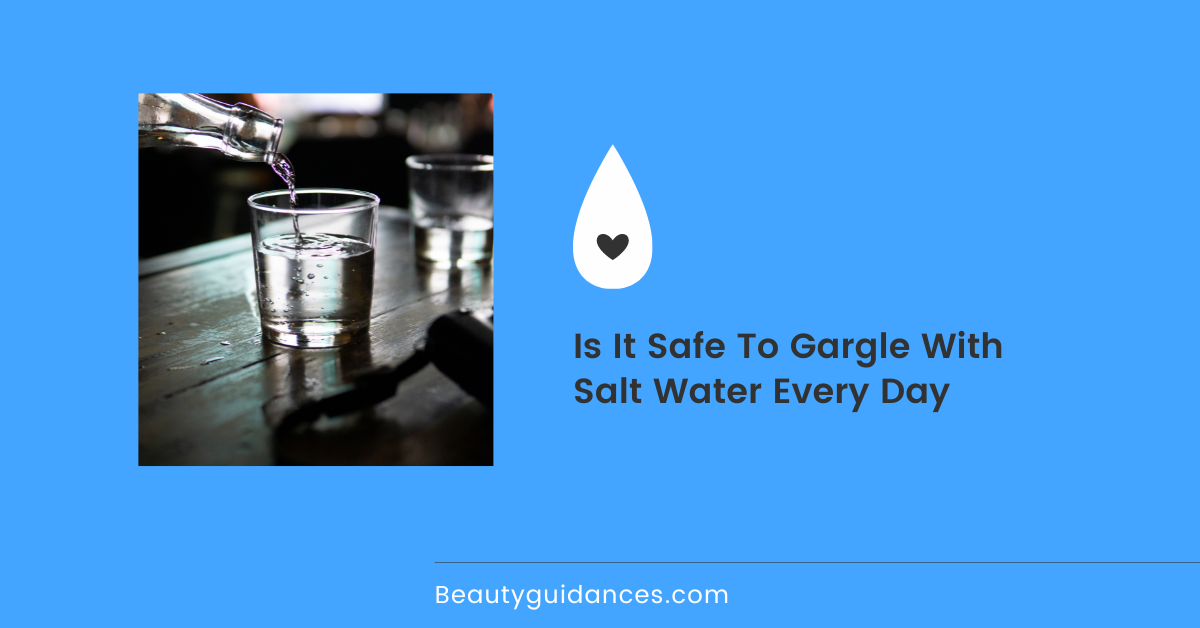Ever heard your grandma suggest gargling with salt water for a sore throat? It’s one of those home remedies that’s been passed down through generations. But, is it safe to gargle with salt water every day? Let’s dive into this salty subject and explore the pros and cons, myths and facts, and everything in between.
What is Salt Water Gargling?
Salt water gargling is exactly what it sounds like mixing salt with warm water and swishing it around your mouth and throat. Simple, right? This practice has been around for ages, touted for its various health benefits.
Salt water gargling is a traditional home remedy involving the mixture of salt and warm water, which is then swished around the mouth and throat. This practice has been widely used for its various health benefits.
The typical recipe involves dissolving 1/2 to 3/4 teaspoon of salt in an 8-ounce glass of warm water. The solution is gargled for about 15-30 seconds before being spit out, and the process can be repeated several times until the solution is used up.
The science behind salt water gargling lies in osmosis, where water moves from areas of low concentration to areas of high concentration of solutes, such as salt. This creates a hypertonic environment in the throat, drawing out excess fluids and reducing swelling, which can help alleviate sore throat symptoms and reduce inflammation.
Salt water gargling can also reduce bacteria in the mouth and throat, promote healing of mouth sores, and improve dental hygiene by keeping gums healthy and freshening breath.
However, it should be used in moderation to avoid potential side effects like dehydration and enamel erosion.
How to Make Salt Water for Gargling
Here’s a quick and easy recipe:
- Mix 1/2 to 3/4 teaspoon of salt in a glass of warm water (about 8 ounces).
- Stir until the salt is completely dissolved.
- Gargle a mouthful for 15-30 seconds, spit it out, and repeat until you’ve used all the water.
Making salt water for gargling is a simple and effective home remedy for soothing a sore throat, reducing oral bacteria, and promoting overall oral health. Here’s a step-by-step guide to prepare your own salt water gargle.
Ingredients:
- 1/2 to 3/4 teaspoon of salt
- 8 ounces (1 cup) of warm water
Instructions:
- Choose Your Salt: Use any type of salt you have on hand, such as table salt, sea salt, or kosher salt. Avoid using salts with additives like iodine or anti-caking agents, as they can interfere with the remedy’s effectiveness.
- Warm the Water: Warm the water to a comfortable temperature. It should be warm enough to dissolve the salt but not so hot that it burns your mouth. Aim for a temperature similar to that of tea or coffee that’s ready to drink.
- Mix the Solution: Add the salt to the warm water. Stir the mixture thoroughly until the salt is completely dissolved. This ensures an even distribution of salt in the solution.
- Gargle: Take a mouthful of the solution and tilt your head back slightly. Gargle for about 15-30 seconds, ensuring the solution reaches the back of your throat. Spit out the water after gargling. Repeat until you have used all the solution.
- Frequency: Gargle with salt water up to three times a day, but avoid excessive use to prevent dehydration and irritation.
This simple remedy can help alleviate symptoms and improve oral hygiene when used correctly.
Why Do People Gargle with Salt Water?
People gargle with salt water for several reasons:
People gargle with salt water for a variety of health benefits, many of which are supported by scientific evidence and centuries of traditional use. One of the primary reasons is sore throat relief.
Gargling with salt water helps reduce inflammation and soothe pain by drawing out excess fluids from inflamed tissues through osmosis. This can significantly lessen discomfort and help clear mucus.
Another common reason is to improve oral hygiene. Salt water has natural antibacterial properties that can help reduce the number of harmful bacteria in the mouth and throat, which can prevent infections and promote overall oral health. Regular use can also aid in preventing gingivitis and maintaining healthy gums.
Salt water gargling is also beneficial for treating mouth ulcers and canker sores. The solution helps to clean the affected area, reduce bacteria, and speed up the healing process. Additionally, it can be used to alleviate sinus issues by helping to clear nasal passages and reduce sinus pressure.
For some, salt water gargling is a preventive measure, especially during cold and flu season. It can help to maintain a clean oral environment, potentially reducing the likelihood of developing infections.
Given its accessibility, cost-effectiveness, and ease of preparation, salt water gargling remains a popular home remedy for various throat and oral conditions.
The Science Behind Salt Water Gargling
The science of salt water gargling lies in osmosis the process where water moves from a low concentration to a high concentration of solutes (like salt) to balance things out.
When you gargle with salt water, it creates a hypertonic environment in your throat, drawing out excess fluids and reducing swelling. Salt water gargling is a time-honored remedy with scientific backing that explains its effectiveness.
The primary mechanism involves osmosis, where a saline solution creates a hypertonic environment. This process draws excess fluid from inflamed tissues in the throat, thereby reducing swelling and easing pain.
Salt has natural antibacterial properties that help reduce the number of harmful bacteria in the mouth and throat. A 2010 study found that regular salt water gargling can lower bacteria counts in saliva, which is beneficial for oral hygiene and preventing infections.
This antibacterial action also helps in reducing the risk of cavities and gingivitis.
Moreover, gargling with salt water can help to loosen mucus and clear nasal passages, providing relief from congestion. It can also soothe throat discomfort by moistening dry tissues and providing a protective barrier.
Research suggests that salt water gargling can alleviate symptoms of upper respiratory infections and even prevent them by reducing viral load and inflammation in the throat.
While it won’t cure infections outright, it can significantly reduce discomfort and speed up recovery time.
Benefits of Gargling with Salt Water
Soothes Sore Throats
One of the most well-known benefits of salt water gargling is its ability to soothe a sore throat. The hypertonic saline solution draws out excess fluid from inflamed tissues in the throat through osmosis, reducing swelling and easing pain. This can provide temporary relief from the discomfort associated with throat infections, colds, and the flu.
Reduces Bacteria and Prevents Infections
Salt has natural antibacterial properties. Gargling with salt water can help reduce the number of harmful bacteria in the mouth and throat. This can be particularly beneficial in preventing and managing oral infections, such as strep throat. Regular use can also lower the risk of developing upper respiratory tract infections by maintaining a cleaner oral environment.
Improves Oral Hygiene
Salt water gargling can enhance overall oral hygiene. It helps in reducing plaque buildup, preventing gingivitis, and keeping gums healthy. By eliminating food particles and bacteria, it can also contribute to fresher breath. For individuals with canker sores or mouth ulcers, salt water can aid in the healing process and reduce irritation.
Eases Sinus Congestion
For those suffering from sinus congestion, gargling with salt water can provide some relief. The saline solution helps to break up mucus and clear nasal passages, reducing pressure and making it easier to breathe. This can be particularly helpful during allergy season or when dealing with a cold.
Promotes Healing
Gargling with salt water can speed up the healing of minor mouth and throat injuries. Whether it’s a sore from biting your cheek or irritation from dental procedures, the saline solution can cleanse the area, prevent infection, and promote faster healing.
Affordable and Accessible
One of the greatest advantages of salt water gargling is its accessibility and cost-effectiveness. Salt is a common household item, making this remedy easy to prepare and use at any time. It provides an affordable alternative to over-the-counter medications and mouthwashes, offering similar benefits without added chemicals or preservatives.
Risks and Considerations
- Dehydration: Overdoing it can lead to dehydration as salt draws water out of your tissues.
- High Blood Pressure: If you’re on a sodium-restricted diet, daily salt water gargling might not be the best idea.
- Teeth Enamel Erosion: Excessive salt can wear down your tooth enamel over time.
How Often Should You Gargle with Salt Water?
Most health professionals agree that salt water gargling is generally safe for occasional use. However, daily gargling might be overkill unless you have a specific condition that warrants it.

Gargling with salt water is a beneficial practice for alleviating sore throats, reducing oral bacteria, and improving overall oral health. However, it’s essential to know how often to perform this remedy to avoid potential negative effects.
For Sore Throat Relief
During acute throat infections, gargling with salt water can be done up to three times a day. This frequency helps reduce inflammation and discomfort without over-drying the throat tissues. Be sure to use a gentle saline solution to avoid irritation.
For General Oral Hygiene
For maintaining oral hygiene, gargling with salt water once or twice a week is sufficient. This practice can help reduce bacteria and plaque, promoting healthier gums and fresher breath.
Daily use for extended periods is not recommended as it might lead to dehydration of the mucous membranes and tooth enamel erosion.
Post-Surgical Care
After dental procedures or surgeries, your dentist might recommend gargling with salt water several times a day for a short period. This helps keep the surgical area clean and promotes faster healing. Always follow your healthcare provider’s specific instructions in such cases.
Preventive Measures
During cold and flu season or if you feel a sore throat coming on, gargling once daily can be a preventive measure to keep infections at bay. However, it’s crucial to not rely solely on this remedy and to maintain other aspects of oral hygiene and general health.
Alternatives to Salt Water Gargling
Not a fan of salt water? No worries! Here are some alternatives:
Honey and Warm Water
Honey has natural antibacterial properties and can soothe a sore throat. Mixing a tablespoon of honey in a cup of warm water can provide relief from throat irritation and cough.
Herbal Teas
Herbal teas, such as chamomile or peppermint, can be soothing for a sore throat. Chamomile has anti-inflammatory properties, while peppermint contains menthol, which can help numb the throat and reduce discomfort.
Apple Cider Vinegar
Apple cider vinegar has antibacterial properties. Mixing one tablespoon of apple cider vinegar in a glass of warm water and gargling can help kill bacteria and soothe the throat. Adding honey can improve the taste and provide additional soothing effects.
Lemon Water
Lemon is rich in vitamin C and has antibacterial properties. Gargling with lemon water (mixing the juice of one lemon with a cup of warm water) can help reduce throat irritation and boost the immune system.
Frequently Asked Questions
How long should I gargle with salt water?
Gargling for about 15-30 seconds is usually sufficient. Repeat until you’ve used up all the solution.
Can children gargle with salt water?
Yes, but supervision is recommended to ensure they do not swallow the salt water. Always consult a pediatrician first.
Is it okay to use table salt for gargling?
Yes, regular table salt works fine. You can also use sea salt or kosher salt if preferred.
Conclusion
Gargling with salt water every day can be a safe and effective practice for oral health and throat care when done in moderation and with appropriate salt concentration. Always consider personal health conditions and consult a healthcare professional if uncertain.

